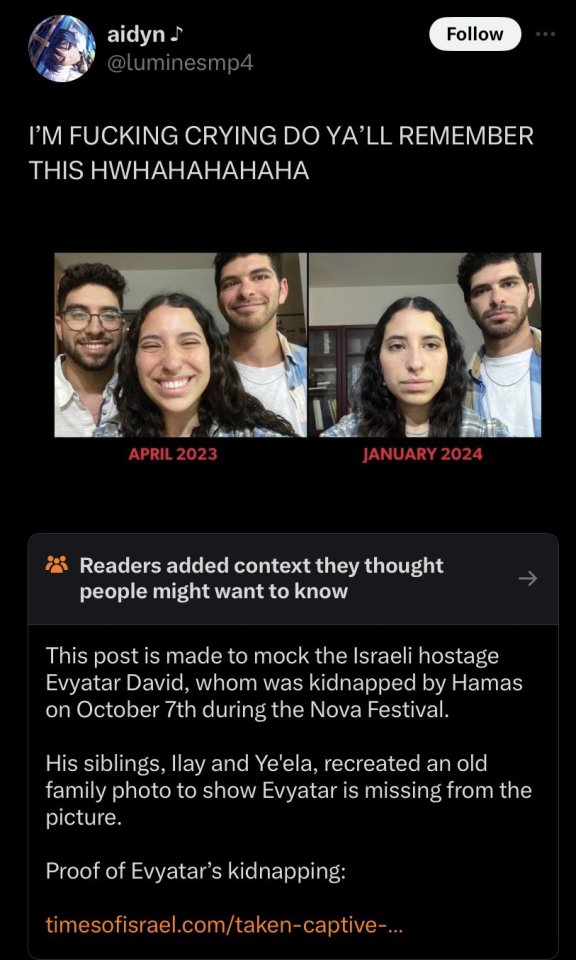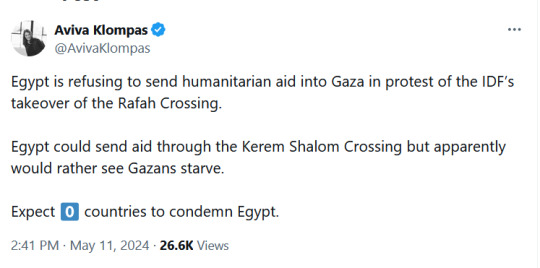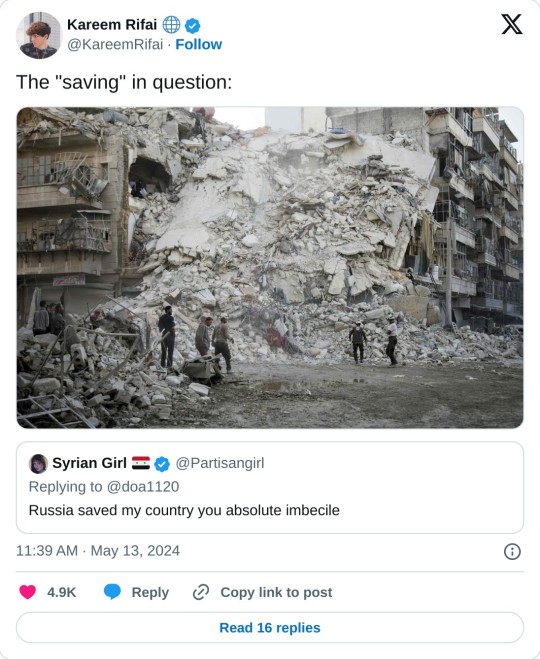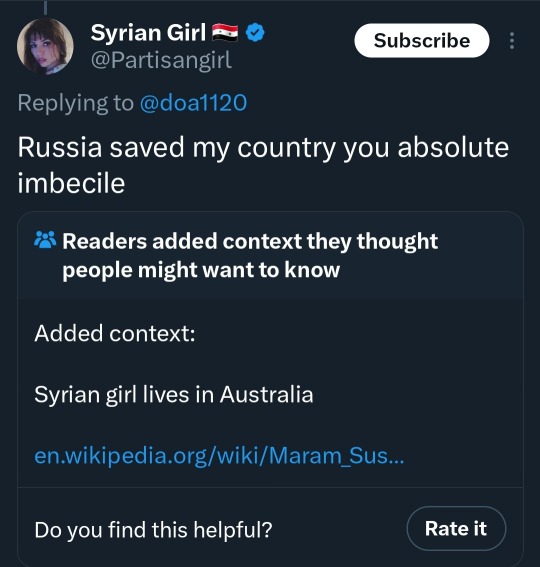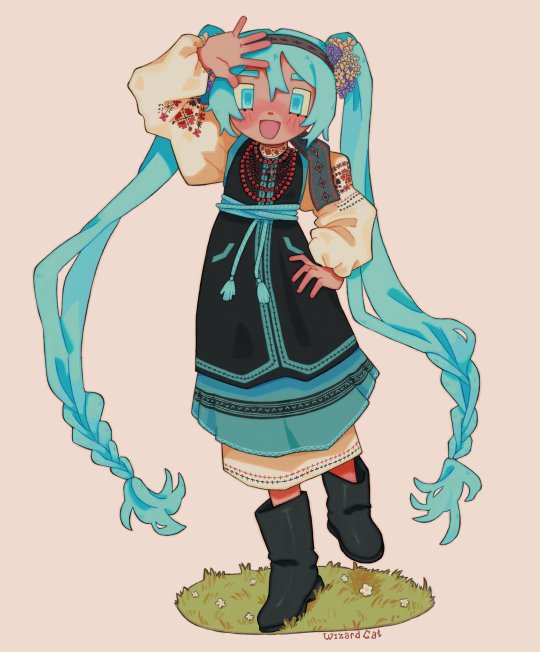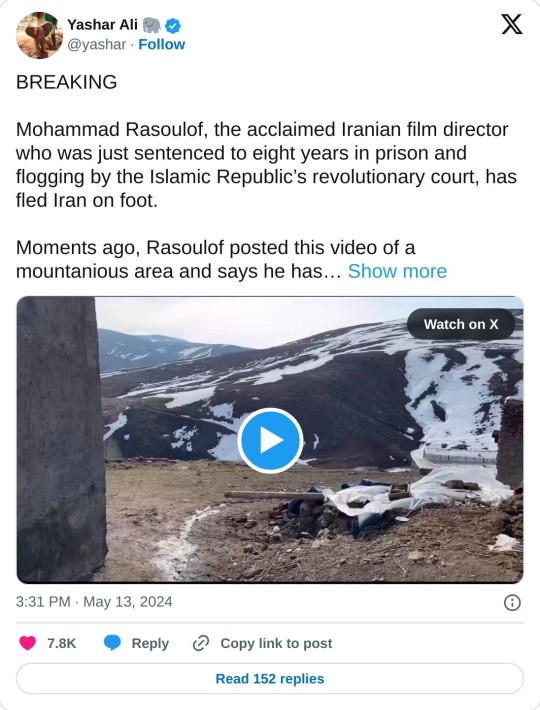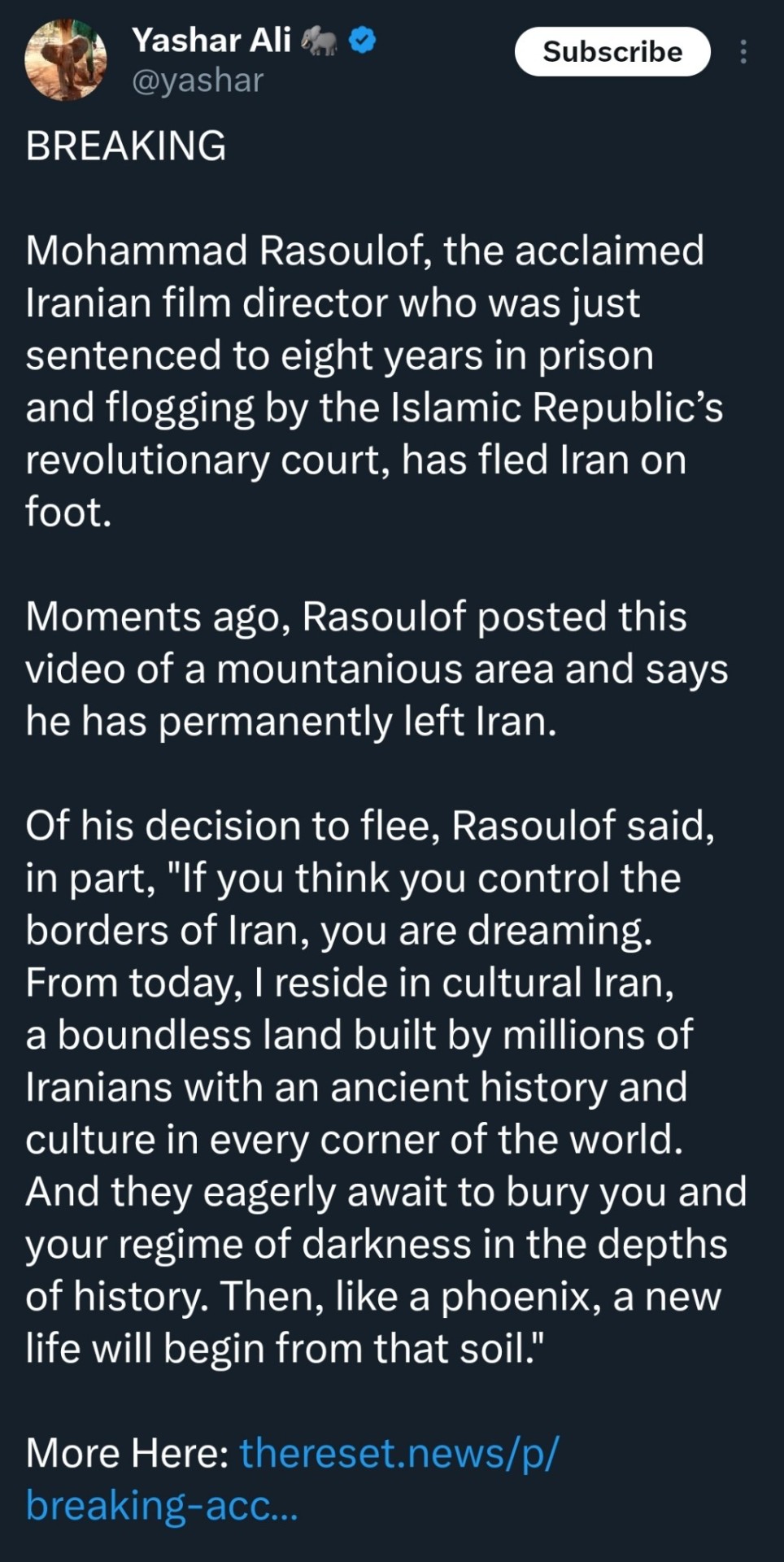Text
Great Beings got inspiration/power from a psychic space octopus
First entity to control the MU was a psychic blob of goo
Custodians of the MU have phenomenal psychic powers.
One of the six dudes made to rule the world has mind control powers.
There's a half-dozen masks with psychic powers.
The Death Roombas can mind-control people with facehugger masks.
At least one of the facehugger masks has mental powers.
Masks that get the wrong sort of rust can mind-control animals and people.
One of the most important heroes in the setting has clairvoyant visions.
Turns out the mind-control rust is spread by slugs made from Makuta juice, that can themselves evolve to the point of being able to spread the mind-control rust at a distance.
The slugs also get later mutated into a super-brainwashing creature that literally feed on your morality.
Makuta-juice itself is also mind-control drugs.
Half the biggest characters in the setting have telepathy, mind-reading or both.
The cops have mind control guns.
This isn't even comprehensive.
There is so much psychic nonsense going on in the Matoran Universe that actually I'm willing to argue that psychic nonsense is more elemental to the MU's existence than half the actual elements.
Like, how much actual Water is in the MU? None. It's all liquid Protodermis. An actual Toa of Water encountered water for the first time in 2004 and went "What the fuck is this!?"
18 notes
·
View notes
Text
Is anyone paying any attention to what's happening in Myanmar? Of the 50 wars currently in play, the civil war in Myanmar is ranked as the deadliest by Global Conflict Tracker yet no one seems to care as the world ficuses on Israel and Gaza, Russian and Ukraine. Get real.
9 notes
·
View notes
Text
remember how half a year ago azerbaijan expelled 100% of the armenian population of artsakh across the border into armenia with no fanfare. nobody complaining about azerbaijan's participation in eurovision or rolling their eyes when the azeris answer interview questions
207 notes
·
View notes
Text
In the war between Israel and Hamas, there have been far too many casualties—thousands of innocent civilians have died, primarily in Gaza. But this war has another less visible casualty: the hundreds of thousands of Jewish immigrants to Israel from the Middle East and North Africa known as Mizrahi, whose history is being erased from the popular narrative about Israel. My community is among them.
When angry protesters hurl charges of apartheid and colonialism at Israel, they are, knowingly or not, repudiating the truth about Israel's origin and the vast racial and ethnic diversity of its nation.
I was born and raised in Iran in a family of Jewish educators. I came of age during the tumultuous years of the Iranian revolution, just as Ayatollah Khomeini rose to power in 1979, and soon thereafter, annihilated his opposition—feminists, leftists, even the Islamic Marxists who had long revered him as their spiritual leader. Until 1979, if anyone had told my observant Jewish family that we would someday leave Iran, we would have laughed. In fact, at our Passover seders, the words "next year in Jerusalem," were always followed by chuckles and quips, "oh, yeah, sure, Watch me pack!" all underlining our collective belief that we were exactly where we intended to remain. We loved Israel, but Israel was a Nirvana—a place we revered but never expected to reach.
The 30 years preceding the Islamic revolution had led the Jewish community to believe that the dark days of bigotry were behind them. And for good reason! When my father was a schoolboy in the late 1930s, he was not allowed to attend school on rainy days. In the highly conservative town where he grew up, in Khonsar, his Shiite neighbors considered Jews "unclean," or Najes. They barred them, among other things, from leaving their homes on rainy days, lest the rainwater splashed off the bodies of the Jews and onto the Muslim passersby, thus making them "unclean," too. Yet, that same boy grew up, left the insular town, attended college in Tehran, earned a master's degree, and served in the royal army as a second lieutenant. (To his last day, my father's photo in military uniform was among his most prized possessions.) After service, he became the principal of a school, purchased a home in what was then a relatively upscale neighborhood of Tehran. The distance between my father's childhood and adulthood far surpassed two decades. It was the distance between two eras—between incivility and civility, bigotry and tolerance.
Yet, as if on cue, the demon of antisemitism was unleashed again. The 1979 Islamic revolution summoned all the prejudices my father thought had been irretrievably buried. One day, on the wall across our home, graffiti appeared, "Jews gets lost!" Soon thereafter, the residence and fabric store my aunt and her extended family owned in my father's childhood town were set on fire after a mob of protesters looted it. Within days, she and her family, whose entire life's savings had burned in that fire, left for Israel. As young as I was, I could see that the regime was indiscriminately brutal to all those it deemed a threat to its reign, especially secular Muslims. But the new laws were specifically designed so that non-Muslims, and women, all but became second-class citizens. Members of religious minorities, especially the Baha'i, could no longer eye top jobs in academia, government, the military, etc. Restaurateurs had to display signs in their windows making clear that "the establishment was operated by a non-Muslim." In a court of law, members of religious minorities could offer testimony in criminal trials, but theirs would only count as half that of a Muslim witness. Jews were once again reduced to Dhimmis—tax-paying citizens who were allowed to live, but not thrive. Then came a handful of executions of prominent Jewish leaders in the early months after the revolution, which sent shockwaves through the community. Jewish schools were allowed to operate, but under the headmastership of Muslims who were officially appointed.
Within a few years after the rise of Ayatollah Khomeini to power, the Jewish population of Iran, which once stood at 100,000, shrank to a fraction of its size. Today, of the ancient community whose presence in Iran predates that of Muslims, only 8,000 remain. For centuries, Iran has been home to the most sacred Jewish sites in the Middle East outside of Israel. But those monuments have either fallen into disrepair or are targets of regular attacks by antisemitic mobs. Only last week, the tomb of Esther and Mordecai—the memorial to the heroine and hero from the Book of Esther who saved the Jews from being massacred in ancient Persia, was set on fire.
How is it that the 90,000-plus who left Iran, many for Israel, are now deemed as occupiers? How do Iranian refugees fleeing persecution become "colonizers" upon arrival in Israel? These families, my aunt among them, were not emissaries of any standing empire, nor were they returning to a place where they had no history. For them, Israel was not a home away from their real homeland. It was their only homeland. The vitriolic slogan that appeared across my home in 1979 demanded that we "get lost!" In 2024, once again, the same Jews are being called upon to leave, this time Israel. Where, then, are Jews allowed to live?
Iranian Jews were not alone. Jews from Iraq, especially in the aftermath of the 1941 pogrom called Farhood, similarly fled their homeland. So did the Jews of Yemen, Tunisia, Egypt, Turkey, Syria, Morocco, Algeria, Ethiopia, Afghanistan, etc. All, destitute and dejected, they took refuge in Israel. Today, they make up nearly 50 percent of Israel's population. To call such a nation colonial GRAVELY misrepresents the facts about Jews and Israel.
In his timeless essay, Looking Back on the Spanish Civil War, George Orwell said that in the Spain of 1937, he "saw history being written not in terms of what happened but of what ought to have happened according to various 'party lines.'" With the alarming rise of antisemitism around the world, and in light of the bloody attacks on Israel by Hamas on Oct. 7, the greatest massacre of Jews since World War II, 2024 bears an uncanny resemblance to Orwell's 1937. But perhaps in no way more ominously than the way truth has been upended to serve an ideological narrative—one in which Jews, who have lived uninterruptedly in that land for more than two millennia, are cast as white non-indigenous interlopers, with no roots in what has always been their ancient homeland.
A public scholar at the Moynihan Center (CCNY), Roya Hakakian is the author of several books including, Journey from the Land of No: A Girlhood Caught in Revolutionary Iran (Crown, 2005).
182 notes
·
View notes
Text
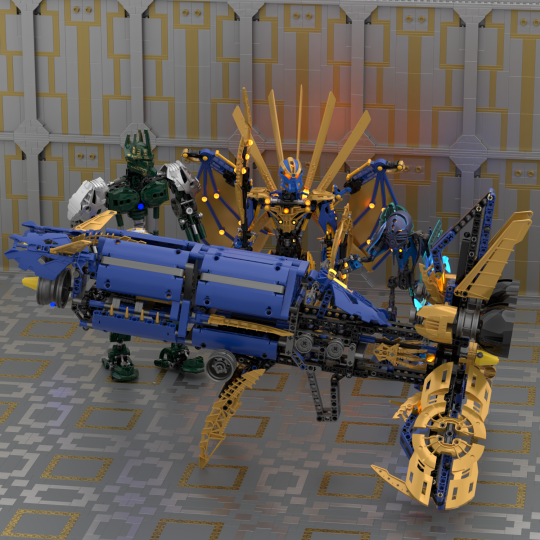
Its my birthday so I made my self MOC receiving the Axalara T5 from Artakha and Helryx
19 notes
·
View notes
Note
I didnt know Joost Klein sympathises with russia ... Could you tell more? Wtaf?
On March 11th 2022 his song "Jackass" in collaboration with the russian CMH, was released.
Here are the lyrics of the song:
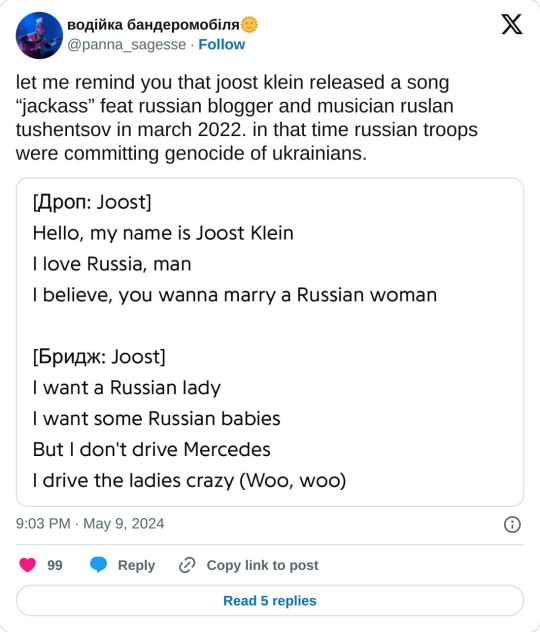
Then in 2023, he recorded another song, with the russian band "Russian Village Boys"
When asked about it, he said that the Jackass song had been recorded before the full scale russian invasion of Ukraine (but obviously after the initial invasion, and obviously) and that he was being funny in it.
There was no further proper normal comment from him, as far as I can see.
27 notes
·
View notes
Text
laughing my head off listening to an old interview w Greg Farshtey because he was telling them about how he got started writing the stories and apparently they were supposed to have someone in New York write the comics. Greg was a writer for LEGO Club magazine at the time and decided to try writing a few pages for fun, told his boss ‘hey I wrote a mock-up’ and his boss went ‘ok great write the whole thing we need a draft in 2 weeks.’ He said he wrote the pages for fun to see if he could do it, because he had never written comics before.
He also said that LEGO put nearly no restrictions on him and the plot of the books was not pre-planned because he basically would just sit down and write and find out what was happening as he was writing, and said that was what made it fun for him, that he was finding out what happens next the same way the audience was. Which makes it even more impressive that there was a level of coherency and consistency and cohesive theming considering it was just him making the whole thing up on the fly.
253 notes
·
View notes
Text
Кому прийшла в голову зробити однакову упаковку для них. Вони абсолютно однакові коли стоять боком
Якщо вас цікавить то кава з соєвим дуже не смачна і на смак схожа на блювоту
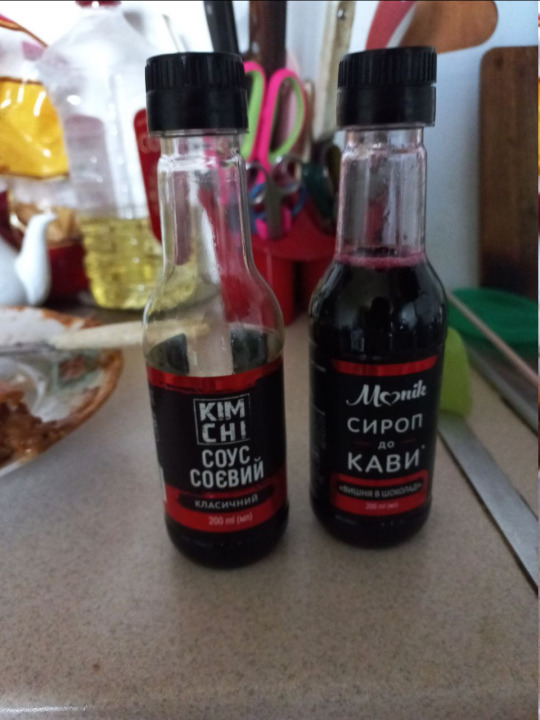
35 notes
·
View notes
Text
Sigil: Toroidal. Recursive. Stuffed full of weird people. Razorvine. Doors to every part of the multiverse. Full of English people but they have a chart to roll on to randomize their features. The dabus and their rebus language. Join a school of philosophy or die.
The Rock of Bral: Chunky. Crowded. Stuffed full of silly people. Ships to every corner of the Material Plane. Full of English people but they're hippos. The arcane and their empty warehouse. Join a violent street gang or die.
All I am saying is that, given the concept of a linchpin city floating in space, Bral is a double, maybe a triple if the other team is crappy, but Sigil is out of the park and halfway across town.
Like, what is up with Prince Andru? What is up is he clearly murdered his way to the throne and he has his brother in solitary welded into a mask, Count of Monte Cristo style.
What is up with the Lady of Pain? Who the fuck knows! Is she a god? Is she a cosmic horror? Try to find out and she will make you wish you were never born.
7 notes
·
View notes
Text

Oh damn the Catholics have joined in on the war against AI "art".
81K notes
·
View notes
Text

I love dinosaurs as much as robots. It is very funny to me when ppl freak out about their childhood icons having feathers maybe.
But it is actually more boring if they are all just like Hollywood imagined.
7K notes
·
View notes
Text
Was anyone going to tell me that Engels really hated the Irish or was I supposed to find that out for myself???
These are some really impressive anti-immigrant talking points:
The southern facile character of the Irishman, his crudity, which places him but little above the savage, his contempt for all humane enjoyments, in which his very crudeness makes him incapable of sharing, his filth and poverty, all favour drunkenness.
With such a competitor the English working-man has to struggle, with a competitor upon the lowest plane possible in a civilised country, who for this very reason requires less wages than any other. Nothing else is therefore possible than that, as Carlyle says, the wages of English working-man should be forced down further and further in every branch in which the Irish compete with him. And these branches are many. All such as demand little or no skill are open to the Irish. For work which requires long training or regular, pertinacious application, the dissolute, unsteady, drunken Irishman is on too low a plane. To become a mechanic, a mill-hand, he would have to adopt the English civilisation, the English customs, become, in the main, an Englishman. But for all simple, less exact work, wherever it is a question more of strength than skill, the Irishman is as good as the Englishman. Such occupations are therefore especially overcrowded with Irishmen: hand-weavers, bricklayers, porters, jobbers, and such workers, count hordes of Irishmen among their number, and the pressure of this race has done much to depress wages and lower the working-class. And even if the Irish, who have forced their way into other occupations, should become more civilised, enough of the old habits would cling to them to have a strong, degrading influence upon their English companions in toil, especially in view of the general effect of being surrounded by the Irish. For when, in almost every great city, a fifth or a quarter of the workers are Irish, or children of Irish parents, who have grown up among Irish filth, no one can wonder if the life, habits, intelligence, moral status -- in short, the whole character of the working-class assimilates a great part of the Irish characteristics. On the contrary, it is easy to understand how the degrading position of the English workers, engendered by our modern history, and its immediate consequences, has been still more degraded by the presence of Irish competition.
—Condition of the Working Class in England, 1845
Dirty, stupid immigrants stealing jobs? Revolutionary take
37 notes
·
View notes
